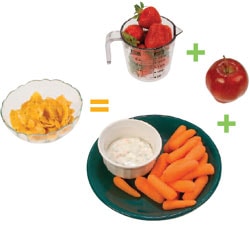To lose weight, you must eat fewer calories than your body uses

This doesn’t necessarily mean that you have to eat less food. You can create lower-calorie versions of some of your favorite dishes by substituting low-calorie fruits and vegetables in place of higher-calorie ingredients. The water and fiber in fruits and vegetables will add volume to your dishes, so you can eat the same amount of food with fewer calories. Most fruits and vegetables are naturally low in fat and calories and are filling.
Simple ways to cut calories and eat more fruits and vegetables throughout the day
Breakfast: Start the Day Right
- Substitute spinach, onions, or mushrooms for one egg or half the cheese in your morning omelet. The vegetables will add volume and flavor to the dish with fewer calories than the egg or cheese.
- Cut back on the amount of cereal in your bowl to make room for some cut-up bananas, peaches, or strawberries. You can still eat a full bowl, but with fewer calories.
Lighten Up Your Lunch

Substitute vegetables such as lettuce, tomatoes, cucumbers, or onions for 2 ounces of the cheese and 2 ounces of the meat in your sandwich, wrap, or burrito. The new version will fill you up with fewer calories than the original.
- Replace 2 ounces of meat or 1 cup of noodles in broth-based soup with 1 cup of chopped vegetables, such as broccoli, carrots, beans, or red peppers. The vegetables will help fill you up, so you won’t miss those extra calories.
Dinner

Add in 1 cup of chopped vegetables such as broccoli, tomatoes, squash, onions, or peppers, while removing 1 cup of the rice or pasta in your favorite dish. The dish with the vegetables will be just as satisfying but have fewer calories than the same amount of the original version.
- Take a good look at your dinner plate. Vegetables, fruit, and whole grains should take up the largest portion of your plate. If they do not, replace some of the meat, cheese, white pasta, or rice with legumes, steamed broccoli, asparagus, greens, or another favorite vegetable. This will reduce the total calories in your meal without reducing the amount of food you eat. BUT remember to use a normal- or small-size plate — not a platter. The total number of calories that you eat counts, even if a good proportion of them come from fruits and vegetables.
Smart Snacks
- Most healthy eating plans allow for one or two small snacks a day. Choosing most fruits and vegetables will allow you to eat a snack with only 100 calories.
Instead of a high-calorie snack from a vending machine, bring some cut-up vegetables or fruit from home. A 1-ounce bag of corn chips has as many calories as a small apple, 1 cup of whole strawberries, AND 1 cup of carrots with 1/4 cup of low-calorie dip. Substitute one or two of these options for the chips, and you will have a satisfying snack with fewer calories.
Remember: Substitution is the key.

It’s true that fruits and vegetables are lower in calories than many other foods, but they do contain some calories. If you start eating fruits and vegetables in addition to what you usually eat, you are adding calories and may gain weight. The key is substitution. Eat fruits and vegetables instead of some other higher-calorie food.
youxfit.blogspot.com..



